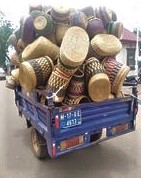Basket weaving; ancient business in Upper East Region
Basket weaving is a very brisk business among both men and women across the Upper East Region.
Many of the weavers, made up of the young and the old, some of whom learnt the weaving from their parents, briskly engage in the activity for onward sale to traders and others who export them to other parts of the world.
Some of the weavers travel from the nearby communities on every market day, which is in every three days, to the former Ghana National Trading Company yard in Bolgatanga, designated as the basket market, to sell their assorted baskets to many buyers stationed at the entrance and in the main yard.
The basket weaving business, over the years, is the source of livelihood for the weavers as they use the proceeds to buy some of their basic needs for the upkeep of the family.
Baskets are the most preferred containers used by many women for shopping. The varieties of baskets include, the U shopper, round baskets, “Moses’ basket” or baby baskets and laundry baskets.
The other kinds of baskets are the pen baskets, pot baskets, mini baskets, dog baskets, V-shaped baskets, umbrella holders, fruit baskets and many more.
Prices of these baskets range from GH¢40 to GH¢100 depending on the sizes, quality and attractiveness.
They also weave hats and fans for sale.
Market day sales
As early as 6am on every market day, hundreds of weavers, mostly women, transport their baskets to the basket market to sell them to many anxious traders who are well-positioned at vantage points within the market.
Some of traders, upon spotting weavers at close range transporting their basket on a bicycle, tricycle or ‘pragya’, quickly ran towards them to quickly bargain with them in an attempt to outsmart the other traders.

Some of the weavers, when not satisfied with prices offered for their baskets, refuse to sell them and rather look out for traders and exporters who are ready to buy them at higher prices.
In an interview, a weaver, Patience Anamolga said basket weaving is a family business inherited from her mother, and had been a source of livelihood for her and the immediate family.
She said with support from her three children, she is able to produce at least five baskets for every market day, saying: “basket weaving is her lifeblood as it had enabled her to take care of the educational and other needs of the children and the immediate family.”
She said “although I spend a lot of time weaving a single basket, it is worth it, because after selling it I am able to get some money to take care of some of my basic needs”.
Another weaver, Sandra Awuni, indicated that she has been engaged in basket weaving for the past 20 years, and that has been her main economic mainstay for the family.
She urged the youth to value the industry and take keen interest in it for sustenance and benefit of future generations and to improve the local economy.



